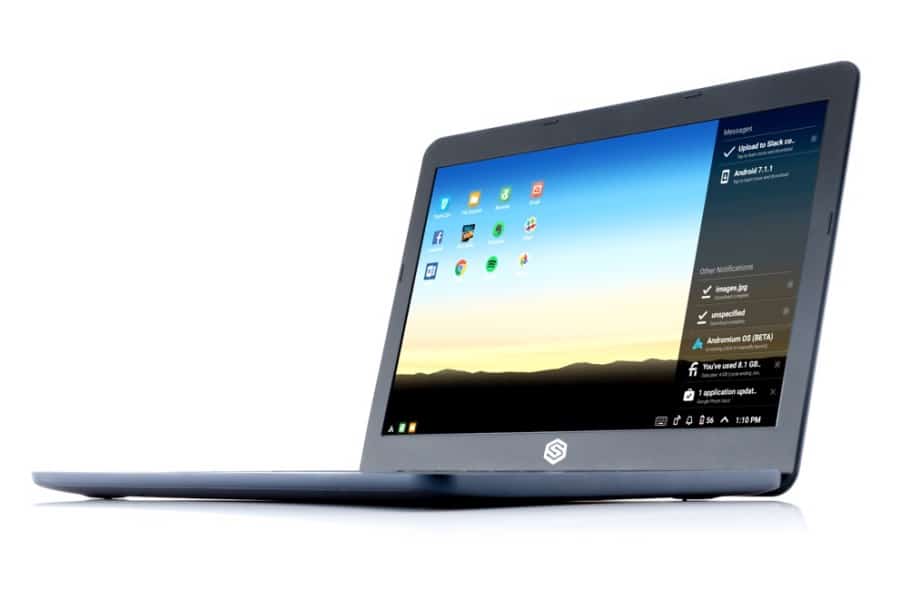
Above: Better days, when the Superbook looked like a great idea and exceptional deal. Photo courtesy Andromium,
BitDepth#1204 for July 04, 2019
There have been some really great items available on Kickstarter and its competitor, IndieGoGo, and I’ve put money behind several of them.
Understand though, that you aren’t strictly speaking, buying something when you back a project on these crowdfunding sites.
A backer is taking a venture capital risk; albeit one that’s softened by the hurdles that a project must cross before collecting any money.
The crowdfunding website holds the cash in escrow until the campaign’s success and the project’s managers demonstrate capacity to produce.
Despite that, there are failures and people lose money on projects that go wrong because crowdfunding is big business.
Kickstarter’s own published statistics note that it has received, at this writing, more than US$4 billion from more than 16 million backers, five million of whom are repeat backers.
In 2015, Kickstarter produced a study by Professor Ethan Mollick of the Wharton School at the University of Pennsylvania that examined project failures.
Among Mollick’s findings? Nine per cent of Kickstarter projects failed to deliver rewards and seven per cent of backers failed to receive their chosen reward.
I’m a seven percenter.
I’ve backed 11 projects on Kickstarter, an eclectic mix of electronic gear, comics, books and manly accessories, ranging in price from US$484 to $9.00.
I’ve only completely failed to receive one, which puts me in line with Mollick’s prediction that repeat backers will experience one complete project failure out of every ten projects they fund.
That project was Andromium’s Superbook, which seemed, in 2016, to be an awesome idea. I wrote about it enthusiastically in January 2017. The device was essentially an 11 inch Macbook Air that included an eight hour battery, screen and keyboard and used your smartphone as its CPU.
I envisioned it as the perfect device for writing on location, particularly in reporting environments. That didn’t happen.
Andromium asked for US$50,000 to produce the Superbook. They had raised $2.9 million when the Kickstarter campaign was over on August 20, 2016.
Then the 16,732 backers waited. And waited. And waited.
The first notice of a production issue came more than a year later on November 29, 2017. There were cheerful backer updates on a monthly basis until then, but a USB hub problem had created issues with the hardware.
The last official update from Andromium was posted on October 19, 2018 and noted that 65 per cent of North American product was shipping from their fulfilment facility.
There seemed little to worry about. The software that powered the link between the phone and the Superbook was not only available on the Google Play store, I’d seen it running successfully on Project Linda, a prototype Razer laptop at CES in 2018 that used the Razer smartphone as a combination trackpad and controller embedded in a snug bay.
The product was late, but production seemed to be progressing.
Unfortunately, the world was changing around Andromium. Smartphone screens were getting larger, crisper and more colour accurate.
A new generation of nearly full-sized foldable Bluetooth keyboards were appearing that were excellent for full-speed typing at a third of the Superbook’s $99 price point.
Production issues and delays kept piling up.
The device is in that strange limbo between great idea and outdated implementation that can destroy products that take too long to get off the drawing board…
Andromium created a Slack channel to keep a conversation going and occasionally posted a note on the lively comments section of their Kickstarter project, where a huge majority of the 13,070 comments are ferally negative.
In a fit of overconfidence in the project, I’d spent $159, which the continued delays and my own blind belief that I’d see a Superbook one day pushed past the point of financial redress.
Meanwhile, Nex Computer has completed a Kickstarter campaign for their second version of the NexDock a product that was clearly inspired by the Superbook but will ship with this year’s technology in September.
It’s unlikely that I’ll ever go top of the line with another Kickstarter project again, though I spent less than many who also got nothing, and I’d had a history of successful crowdfunding project delivery before the Superbook.
Someday, a Superbook might show up at my shipper.
I wouldn’t know what to do with it now. Other technologies have replaced it, and the device is in that strange limbo between great idea and outdated implementation that can destroy products that take too long to get off the drawing board in a globalised world of rapid prototyping and high speed production.



